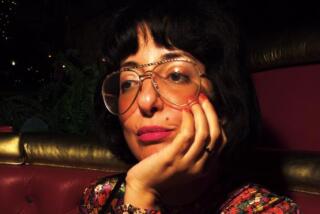Angst, from an Iranian youth perspective
Listen to the voices of Iranâs youth:
At an art school for boys: âFreedom . . . is unknown to me. I donât know what it is.â
At a prayer meeting: âThey only want Western culture, like sexual freedom. . . .â
A young man: âWe are not closed off from the world. We have the Internet and satellite TV.â
A young woman: âIf the police find out we have been driving with our boyfriends, they will punish us.â
These comments are contained in a short documentary called âGeneration Tehran,â made by a 30-year-old West Hollywood filmmaker named Sara Bavar, who traveled to Iranâs capital last year and chronicled the thoughts of young people living in a country that the Bush administration has labeled an âaxis of evilâ and a âterrorist state.â
Her documentary, which has screened at the Cannes and Milan film festivals, and at film festivals in Philadelphia and Sacramento, will be shown Saturday at the ArcLight Theaters in Hollywood as part of the Hollywood Film Festival.
Bavar finds that Tehranâs youth are often conflicted over their nationâs past and are apprehensive for its future. Although they express endless fascination with Western dress, hairstyles and pop culture that comes to them via the Internet, over satellite television and in Western magazines and they chafe under their hard-line Muslim governmentâs censorship rules, they are proud of their countryâs history and concerned with losing their traditions.
âWhat I found most surprising is that there is so much concern for social issues rather than political issues,â Bavar said in a phone interview from her home.
The film notes that 70% of Iranâs population is under 30 years of age. It shows a side of Iran that might not always get noticed on Americaâs evening news. Yes, there are devout Muslims, but there are also guys who slick their hair up and back like something out of a James Dean movie.
Bavar, who was born in Iran and came to America when she was 2, had been living in London and working as a content development manager, doing documentaries for the British television network ITN, when she decided she wanted to strike out on her own and make serious films.
âWhen they found out I wanted to do this film, they said, âDo it for us,â â Bavar recalled. â âBut donât do it about this, do it about plastic surgery in Iran.â I said, âLetâs do something a little more interesting that hasnât been done at all.â But they werenât interested.â
So she sold her house in London and went to Tehran, where she recruited two cameramen and an editor for her project.
Getting permission to use a professional-style camera in Iran was difficult, she said. âI was given permission to only film the exterior of Tehran. I couldnât actually do interviews. I wasnât allowed to talk to anybody, but we went ahead and did it.â
She visited such places as the Darak mountain trail, where people hike and picnic. âThis is a place young people hang out,â Bavar explained. âDarak is where social economic classes are a little lower than [on] a few of the other trails. What was interesting to me was that these kids donât have much money, but look how much they are enjoying themselves.â
She went to the area of Tehran known as Iran Zameen, where young men cruise the streets in their gleaming cars. âYou canât just walk up to a girl on the street and hand her your phone number,â Bavar said. âBasically, itâs like going up and down Sunset for three hours. They are exchanging phone numbers, text messaging real quick and then they meet up, party and do whatever.â
She went to a prayer meeting where only men were allowed. She attended a theater group, went inside a busy shopping mall, talked to young people at universities.
âI got stopped a lot on the street,â she recalled. âThey asked me, âWhat do you have a camera for?â You have to show them your permission. For the most part, when they found out that I came from abroad, they became excited. They donât want to be in our film, but they want to talk to us.â
She said it sometimes took an hour to convince people to speak their minds. âI spoke Farsi, so that meant a lot to them.â Initially, they were kind of standoffish, she noted, but when they got to know her, they relaxed and their opinions flowed.
One young woman remarked, âWhy do we have to be so different from other people?â Another said, âWe have love and kindness. That, I think, they donât have in other parts of the world.â
As part of her questioning, she would ask the Iranian youth what they wished for. One said âreform.â But a young woman smiled and said, âA good husband -- and it doesnât hurt if he also is good looking and a good dresser.â
--
More to Read
The biggest entertainment stories
Get our big stories about Hollywood, film, television, music, arts, culture and more right in your inbox as soon as they publish.
You may occasionally receive promotional content from the Los Angeles Times.










